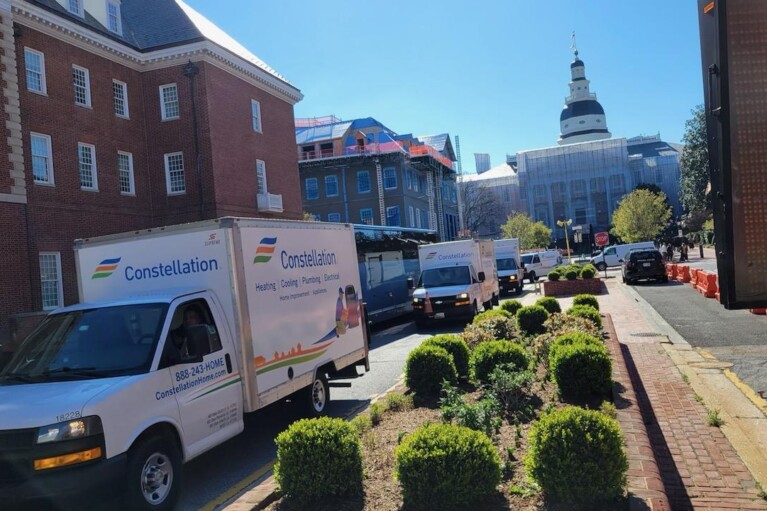New study charts utilities’ political spending and influence in Md. State House

As lawmakers and consumer advocates in state capitols — including in Annapolis — begin to more closely scrutinize the political activities of utilities across the country, a good government group is due to release a report that attempts to quantify the utilities’ level of political spending and lobbying activity in the Maryland State House.
A new study from the Maryland PIRG Foundation, which is being released on Thursday, found that the state’s monopoly utilities have undue influence in state government policymaking. They employ an army of State House lobbyists, Maryland PIRG said, and spend millions of dollars on advertising and association membership in an attempt to sway state policy.
The report, called “Politics of Power,” comes as lawmakers in Annapolis pursue legislation that would prevent utilities from passing on the costs of political and lobbying activities on to their customers and would also require the companies to be more transparent about their financial information and governing structure.
The bills, sponsored by Del. Lorig Charkoudian (D-Montgomery) and Sen. Katie Fry Hester (D-Howard and Montgomery), have yet to be voted on in their respective committees. A similar bill from Charkoudian stalled last year.
Maryland’s electric and gas utilities operate as monopolies in their regions and are regulated by the Public Service Commission (PSC), a regulatory body whose five commissioners are appointed by the governor. As a result, the report asserts, they automatically have a powerful position in the state’s political firmament.
“This places our utilities in a unique position in which the state has direct control over how much profit they are authorized to deliver to their shareholders,” the report says. “This dynamic makes utilities’ political dealings more vulnerable to corruption or the perception of corruption in the public’s eye. It’s therefore of utmost importance that utility activities designed to influence the actions of decision-makers and public opinion happen with clear guidelines and with robust transparency in the decision-making and ratemaking process.”
The national energy transformation away from fossil fuels and towards more electrification in the building and transportation sectors are placing new pressures on the utilities, Maryland PIRG acknowledges. But that also puts pressures on lawmakers who are setting policies that impact the utilities as well as on regulatory agencies like the PSC.
Overall, there were 71 lobbyists registered to represent the utilities’ interests at the beginning of this year’s legislative session, according to the report, led by Baltimore Gas and Electric and Pepco, which have 22 each. BGE and Pepco, the two biggest utilities in the state, are both owned by Exelon, an energy giant based in Chicago.
Washington Gas, the next biggest utility in the state, is paying eight State House lobbyists in 2024.
Utilities lobbied lawmakers on at least 94 bills that were under consideration during the 2023 General Assembly session, and 11 gas and electric utilities collectively spent $2,204,231 on lobbying activities from Nov. 1, 2022 to Oct. 31, 2023, the Maryland PIRG study reported. Five of the utilities spent six figures on lobbying: Pepco ($647,813), BGE ($443,983), Washington Gas ($359,505), Choptank Electric Cooperative ($257,694), and First Energy Inc., parent company of Potomac Edison ($236,680).
Five utilities across the state spent $4,214,533 collectively on advertising in 2022, the Maryland PIRG report found, led by BGE, which spent $1,744,923. Pepco spent $1,404,829, Delmarva Power, another Exelon company, spent $586,529, while Southern Maryland Electric Cooperative spent $434,495 and Columbia Gas spent $43,707.
Trade associations can also burnish the images of utilities and promote their agenda. BGE spent $830,075 on trade association dues in 2022, the report showed, while Pepco spent $500,000.
Despite publicizing all this data, Maryland PIRG said the utilities play an important role in the state and deserve their place at the table as lawmakers are making policy. But they also offered a warning.
“We need our utilities to focus on their core mission of providing the public good with reliable power,” the good government group wrote. “When our decision-makers debate public policies that impact our utilities, we need utilities at the table to share their expertise and opinions on how best to meet their charter obligations. However, in addition to providing this input, our investor-owned utilities may also be engaging in lobbying and other activities meant to influence policymakers and public opinion in ways that serve their bottom line, sometimes at the expense of the public interest. It’s not always easy for decision-makers or the public to navigate these dynamics.”
With all this as background, the Charkoudian-Hester bill would prohibit a Maryland utility that is regulated by the Public Service Commission from recovering through rates any costs associated with lobbying or political activities, which is defined in the legislation. The bill would also require each utility with more than 75,000 customers in the state to submit a report to the PSC by Jan. 1 each year containing a range of financial information. And the bill would require each electric company that sends representatives to the board meetings of the regional grid operator, PJM, to report information to the PSC every year containing related to votes at the meetings.
“What happens and doesn’t happen at PJM is really important for our clean energy transition, for our ratepayers and deciding how much transmission we need to build,” Charkoudian told her colleagues on the House Economic Matters Committee during a hearing on the bill late last month.
Charkoudian also said that Maryland could be part of a trend in demanding more transparency from its utilities: Similar legislation is being contemplated in Illinois, Pennsylvania, West Virginia and Virginia, which are also PJM states.
But utilities testified in opposition to the bill, noting that they are heavily regulated entities whose activities are closely scrutinized by the Public Service Commission.
The bill “places a burden on Maryland utilities that are not placed on other industries,” said Anne Klase, a lobbyist for Pepco and Delmarva Power.
Nevertheless, the political and lobbying pressures that utilities bring to bear on policymakers can be enormously impactful, said Emily Scarr, the director of the Maryland PIRG Foundation.
“The decisions made by our legislators and regulators as they work to meet Maryland’s ambitious climate goals will have real consequences for Marylanders’ health and financial security,” she said.




 Creative Commons Attribution
Creative Commons Attribution